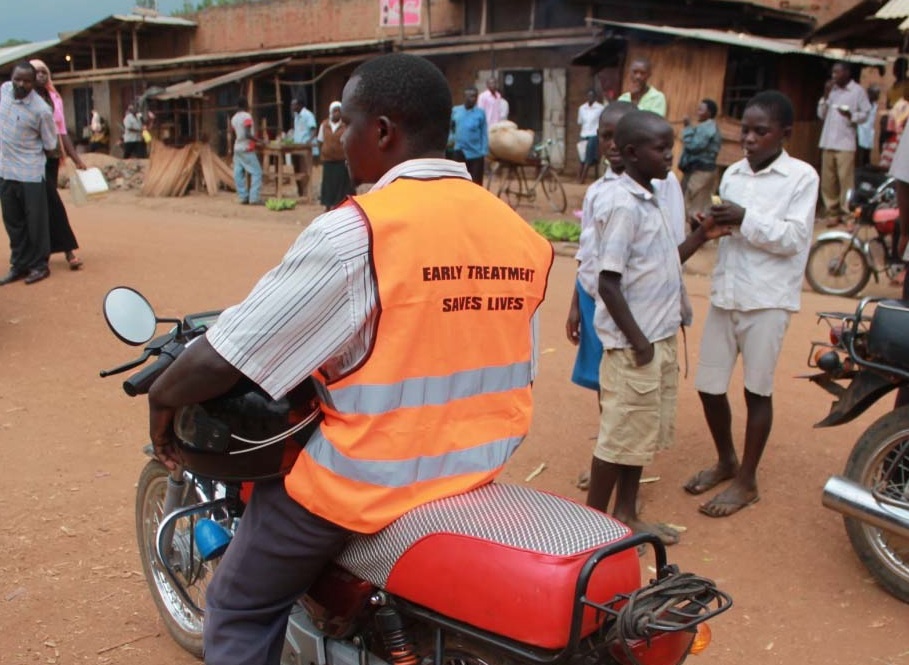Leila Noisette, Malaria Consortium Advocacy Officer in Kampala, travelled to Mbale in eastern Uganda, for the launch of an innovative new transport system designed to help tackle the burden of malaria.
In Mbale, eastern Uganda, 212 boda‐boda (motorcycle taxi) riders have been trained to handle the transfer of sick children from villages to health facilities as part of an on-going project to reduce child deaths in the region.
Training for boda-boda riders is part of a Malaria Consortium project to improve malaria control and strengthen the health system in Mbale, funded by Comic Relief. The main goal of the project is to contribute to a reduction in child deaths from malaria by establishing and training Village Health Teams (VHTs) to recognise the symptoms of malaria and other childhood illnesses, to ensure the availability of medicines and other health supplies in health facilities, and to establish a functional community-facility referral system.
The project is implemented by Malaria Consortium, in partnership with the Ministry of Health, Mbale Regional Referral Hospital, Mbale District Health Authorities, Central Public Health Laboratories (CPHL) and the local communities.
Training of boda-boda riders is a key element of the project providing timely access to healthcare for rural and remote communities. The training is carried out by the Ugandan police force and Mbale District Health Team and focuses on traffic rules and how to handle a patient and seeks to improve referral times between VHTs and health facilities. VHT leaders in each village provide boda-boda riders with vouchers according to the distance they have to cover to transport patients to a health facility. The riders are then paid by the health worker at the health facility upon presentation of the coupon.
“Access to public health services is very limited in this hilly region,” says Dr. Nathan Kenya‐Mugisha, Programme Manager for the Malaria Consortium project, “Availability and affordability of transport means is crucial for caregivers to follow referral advice from VHTs and health workers to get appropriate treatment for children on time.”
According to Augustine Mafabi, a VHT leader in Jewa Parish, Bufumbo Health Centre IV is the nearest public health facility for most of the communities in the area.
Zainab Nafuna is waiting at the health centre. It took her four hours to reach the health facility from Bumadanda village, carrying her second born child only 10 days after giving birth. Her newborn baby is severely sick and she has been sent to Mbale Regional Referral Hospital. Zainab now has to travel back to her home and prepare again for the journey to the hospital the following day. She says she will feel very happy when transport provided by boda-bodas riders will enable her to access timely healthcare for her two children. Other mothers waiting had also walked hours to reach the facility.
The introduction of this transport system aims to increase the number of children following referral notes from VHTs as well as dramatically reduce the time in which patients who are sick reach the health facility. Ronald Wambede and Badiru Massa, two of the four boda‐boda riders trained in Jewa parish have now agreed to provide 24-hour-a-day transport for sick children referred by the VHTs. They said: “On a boda‐boda, these women would have reached the health centre in 30 minutes.”
With reference to lessons learnt throughout the implementation of the transport system in Bunghoko North, there are plans to scale up the project to the whole district next year. The District Health Officer, Dr. John Baptist Wanyaie, said: “Working together to improve access to healthcare will strengthen the capacity of Mbale district, as a high risk community, to tackle the burden of malaria.” Communities are already being encouraged to think about how to sustain this transport system after the project ends.
